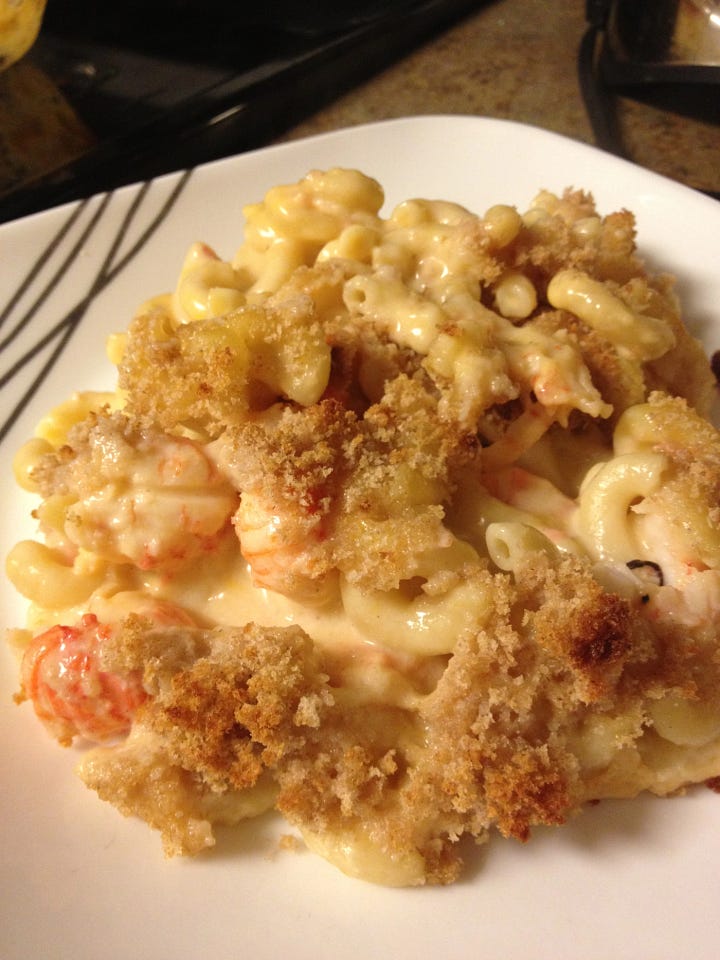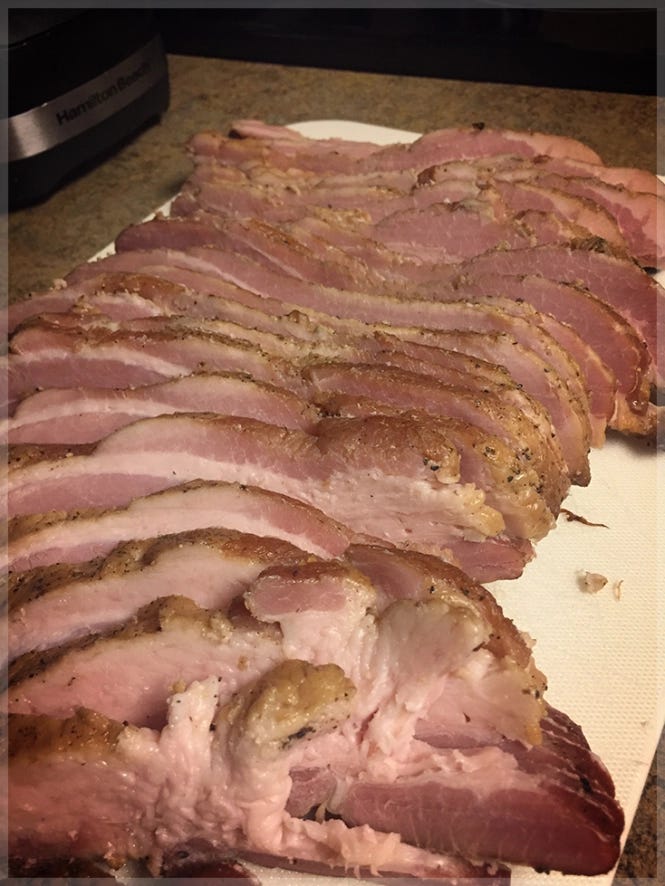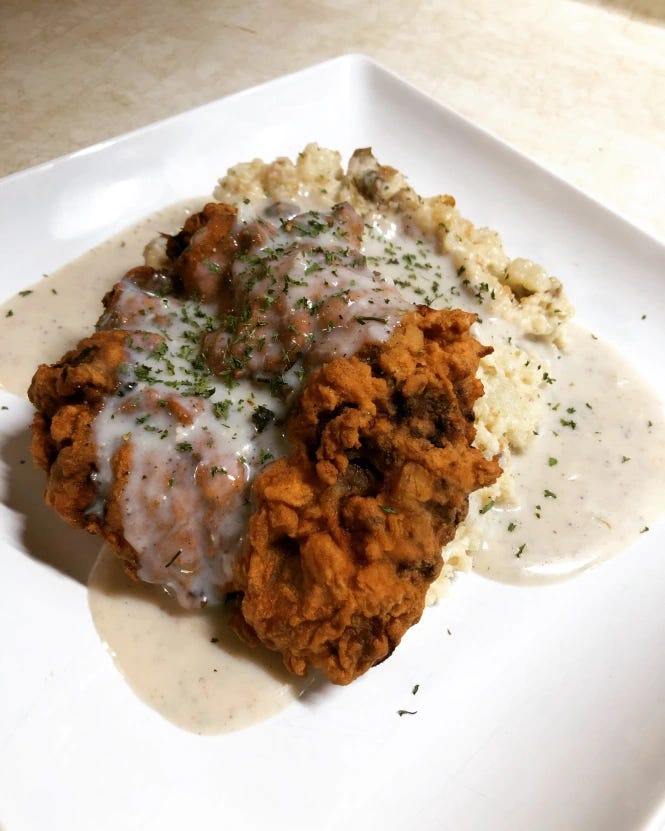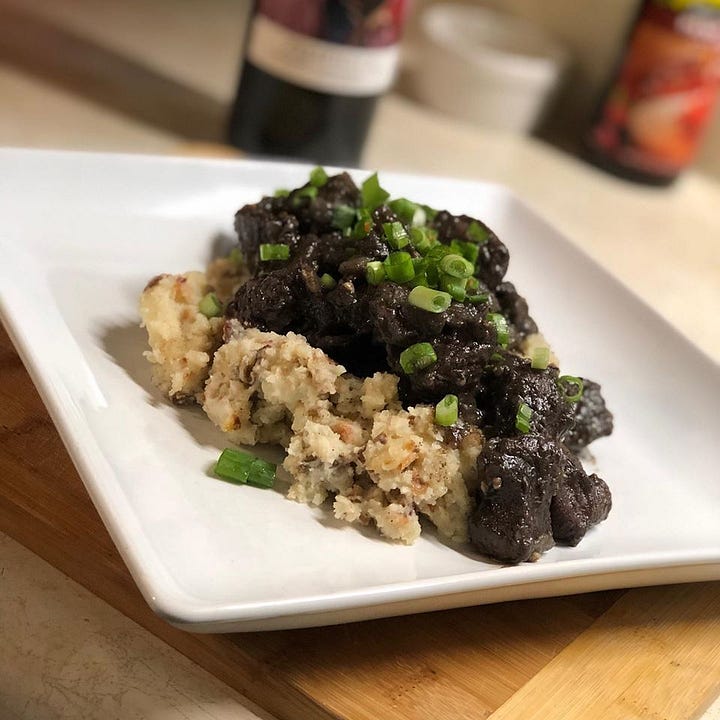I’m going to talk about my grandfather, “Paps,” a lot in these essays. Honest and sensitive, rugged yet kind, he was a great example of masculinity for me as I was growing up. In my formative years, I spent about half of my time at his house and was usually with him either mowing lawns, upgrading the house, watching wrestling or just sitting in the driveway talking. He didn’t spend much time in school, yet had a wealth of knowledge in a variety of topics. He often felt insecure in social situations but was always able to turn it on and become the Nature Boy if there was ever a group of old women nearby.
There wasn’t much the old man couldn’t do in my eyes.
Well … Except cook.
I remember a time my Gran was sick and unable to get out of bed. As the afternoon wore on, I was getting my hopes up that Paps would take me out for dinner since Gran was unable to cook. My high hopes were crushed, however, when he poured a can of pinto beans into a saucepan and warmed it on the stove. That was our dinner that night.
Another time, I found myself in Gran and Paps’ den during a winter storm. The power had gone out and the snow rendered us immobile since they lived at the top of a series of hills. We’d hoped the power would be restored by dinner time but it wasn’t. Not to be deterred, however, Paps disappeared to the kitchen for a few minutes with a flashlight, only to return to the kerosene heater we’d gathered around with a saucepan and a can of beans that he then warmed on the top panel. Shortly after, dinner was served.
My Paps’ culinary abilities were limited to heating up cans of beans in saucepans and making ham-and-cheese sandwiches for lunch. Fortunately for him, my Gran was a great homemaker and a wonderful cook so he never really had to worry about it. This is all too common among American men. The gender roles espoused by classic masculinity considers this not just normal but an arrangement to be pursued. Eating well and being served fulfilling meals is paramount to romanticized manliness. Boys are often taught that if they want to succeed in life, they need to marry someone who can cook for them.
Historically, of course, you have the stories of the hunter-gatherer, usually thought to be men (though maybe not), who would return home after a day in the fields to a woman who had been slaving away on something for them to eat. There’s also the classic mid-century homemaker who wore her cute apron, had the house cleaned, the children tended to, her face painted up perfectly and dinner on the table when her hard-working husband came home from work.
In my experience, I’ve found that this arrangement has not only taught men to seek out a sufficient cook in their partners, but to also take no interest in learning how to do it themselves — negative interest, even. They’ll say cooking is a “woman’s job” and equate it to being subservient. Many men I know (from a variety of generations) are highly dependent on their partner to feed them properly. Otherwise, they heavily rely on restaurants, drive-thrus and pre-packaged meals for sustenance, a recipe for heart disease and diabetes if ever there was one.
The one exception, of course, is barbecuing. I guess it’s considered more “manly” to cook meat over an open flame while chugging crispy boys with the bros. I love doing this, too, but I also see the poor logic since grilling meat is fundamentally the same thing as making a casserole or baking a cake: seasoning and arranging ingredients then applying heat to them. With this in mind, what makes cooking in the kitchen effeminate and grilling on the barbecue not? Similarly, what makes grilling on the barbecue masculine but cooking in the kitchen not?
Answer: It’s not. It’s a bullshit gender norm endorsed by lazy men. Despite multiple examples of masculine men dominating in the kitchen and becoming world famous for it (some of my personal heroes are Gordon Ramsay, Alton Brown and Justin Warner), it seems the average American male is simply too macho to strap on an apron and dice a shallot or chiffonade some basil.
I bought into this lie for a big portion of my life and didn’t know how to prepare much food for myself outside of a bowl of cereal and a toasted Pop-Tart. If I was at home, my mom cooked. At my grandparents’ house, Gran did it all (unless, of course, it was one of Paps’ famous bean dinners). I didn’t have to pay attention, I didn’t have to learn … so I didn’t.
Fast forward to 2008 when I finally moved out of my parents’ house after graduating college. I was living with my girlfriend in North Carolina and she was the sole breadwinner since I hadn’t found a job. I picked up freelance work when I could, but jobs in my industry were non-existent in that small town and remote work was scarce at the time. Feeling as though I needed to pull my weight at home, however, I decided to eschew the image of typical masculinity and began doing all the cleaning, all the laundry and all the cooking.
It started with a chicken breast I seared in a skillet. It excited me so much that I called my mom to tell her about it after dinner. I couldn’t believe I just made something that good on my own. And it wasn’t even that difficult! I moved on to semi-homemade dinners like Hamburger Helper and Shake-and-Bake chicken, but eventually turned to more complex recipes like my first homemade pizza (a copycat recipe of Mellow Mushroom’s “Magical Mystery Tour” pie). I only lived in that shabby apartment for about a year before moving back to Tennessee, but during that time, I had developed a passion for cooking.
The next few years saw my love affair with cooking grow exponentially. I was making everything from grilled strawberry shortcakes (with homemade cake and homemade whipped cream) and lobster mac-and-cheese to hickory-smoked bacon that I had cured, smoked and sliced myself. It didn’t matter if it was fried, boiled, roasted, braised, grilled, broiled or smoked, I wanted to learn how to do it.


Around 2012, I started baking as a form of stress relief. If I had a particularly shitty day at the office, I would go home and bake cakes, pies, cookies and even homemade biscuits that I would then package and bring to work the next day. Before long, I was famous around the office as being the person to see if you wanted a midday snack or a sweet treat. I got to meet people from all over the company, from the broom closets to the executive suites, and those connections earned me a lot of professional benefits, not to mention long-term friends. I’ve gone so far as to say that learning to cook is by far the greatest skill I’ve acquired for my (entirely unrelated) professional career.
Later, in 2020, a single male friend of mine was leaving the gym and said he was going to go by Kroger to grab another rotisserie chicken for dinner, not his first of the week. It wasn’t because he loved rotisserie chickens that much (I mean, I do), but because he didn’t know how to do anything else and didn’t have anyone to do it for him. Other meathead friends of mine from that era were doing much the same with bags of frozen grilled chicken from Trader Joe’s or takeout cheeseburgers from Twin Peaks.
That same year, I would break up with a woman I’d been dating for about two years and celebrated my singleness with some dinner parties for one at home (the pandemic was in full effect by then). The first included country-fried venison steak with homemade pepper gravy and garlic-and-goat-cheese mashed potatoes; the other was Nordic-braised venison roast with charred carrots and bacon-and-goat-cheese mashed potatoes. I ate well when I was taken, but I was eating even better on my own!


I wouldn’t be alone long, however, as a few months later Katie swooped in and quickly showed me why I should put a ring on it. She’s a phenomenal cook, too, but she was blown away by my chops in the kitchen (I cooked for her on our second date). I like to think it was my devilishly good looks1, watermelon-sized biceps2 and charming sense of humor3 that won her over, but I’d say it had more to do with that bechamel-topped lasagna I made for her birthday that first year.
For a while, we took turns cooking every other week, always trying to impress the other with what we can do in the kitchen. That was a great setup because even though I love cooking, I do still love to be cooked for from time to time! Lately, however, her career has exploded and her business has really taken off, so I’ve again offered to pull my weight at home by taking over the cooking duties indefinitely. She’ll still dazzle me with some homemade deliciousness if I ever need her to and we often cook together on the weekends, but it brings me a great sense of fulfillment to support her career and serve her as my wife through my love of cooking.
They say the way to a man’s heart is through his stomach, but in my experience, that’s a beginner’s game compared to how much women love a man who can cook for them.
To recap: Classic American masculinity says a woman’s place is in the kitchen and a man has no need to learn how to cook. My experience, however, has shown that learning to cook is paramount to being a provider in the household, can be great for one’s professional growth, will make sure you’re eating quality food if you’re single and can help you cure that singleness by knocking the socks off of that woman you’ve had your eye on for three years in boxing class4.
You tell me which approach is more manly.
Bon appétit!
-jtf
Exaggeration.
Bigger exaggeration.
This one’s real.
Obvious specific example is obviously specific.




